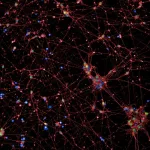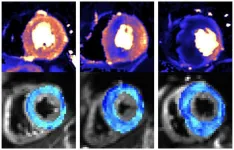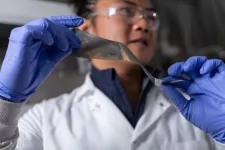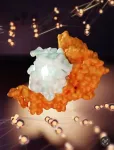(Press-News.org)
· Contacts between lysosomes and mitochondria are broken due to Parkinson’s mutation
· Lysosomes cannot ‘feed’ mitochondria with essential metabolites
CHICAGO --- Northwestern Medicine scientists have uncovered a new mechanism by which mutations in a gene parkin contribute to familial forms of Parkinson's disease. The discovery opens a new avenue for Parkinson’s therapeutics, scientists report in a new study.
The Northwestern scientists discovered that mutations in parkin result in a breakdown of contacts between two key workers in the cell –- lysosomes and mitochondria.
Mitochondria are the main producers of energy in cells, and lysosomes recycle cellular debris that accumulates during normal function of our cells. These organelles are especially important in our brains because neurons are highly dependent on energy production by mitochondria, and because of their activity, neurons produce an abundance of cellular debris that must be cleared by lysosomes.
In a prior study, published in Nature, Dr. Dimitri Krainc, chair of neurology and director of Simpson Querrey Center for Neurogenetics at Northwestern University Feinberg School of Medicine, and his group discovered that lysosomes and mitochondria form contacts with each other. After the initial discovery, Northwestern scientists tried to understand the function of these contacts in Parkinson’s disease.
In the new study published in Science Advances, the investigators report that lysosomes help mitochondria by providing key metabolites for their function. Mitochondria must import many of their essential ingredients, but it has not been well known where some of these metabolites come from. On the other hand, lysosomes serve as recycling factories in cells and, therefore, produce many breakdown products that could be used by other organelles such as mitochondria.
In this work, scientists found that lysosomes provide important amino acids that support the function of mitochondria. However, they also found that in some forms of Parkinson’s disease, lysosomes cannot serve as a “helping hand” to mitochondria because the contacts between the two organelles are disrupted. This results in dysfunctional mitochondria and ultimately degeneration of vulnerable neurons in Parkinson’s disease.
“Findings from this study suggest that dysregulation of mitochondria-lysosome contacts contributes to the Parkinson's disease pathophysiology,” said Krainc, the study’s corresponding author. “We propose that restoring such mitochondria-lysosome contacts represents an important new therapeutic opportunity for Parkinson’s disease.”
From a broader perspective, this study opens a new avenue of research in neurodegenerative disorders, by highlighting the importance of direct communication and collaboration between cellular organelles in the pathogenesis of these disorders.
The first author of the study is Dr. Wesley Peng who recently completed the medical scientist training program (MD-PhD) at Northwestern and currently serves as a neurology resident at Mass General Brigham and Harvard Medical School. Other contributors to the study include Leonie Schroder, Pingping Song and Yvette Wong.
The title of the study is “Parkin regulates amino acid homeostasis at mitochondria-lysosome contact sites in Parkinson’s disease.”
The study was supported by the following National Institute on Aging grant AG066333, National Institute of Neurological Disorders and Stroke (NINDS) grants NS109252 and NS122257, all from the National Institutes of Health.
END
A research group in Carnegie Mellon University's Robotics Institute is creating the next generation of explorers — robots.
The Autonomous Exploration Research Team has developed a suite of robotic systems and planners enabling robots to explore more quickly, probe the darkest corners of unknown environments, and create more accurate and detailed maps. The systems allow robots to do all this autonomously, finding their way and creating a map without human intervention.
"You can set it in any environment, like a department store or a residential building after a disaster, and off it goes," ...
What determines whether we become overweight? Aside from lifestyle, predisposition plays a role, but genes cannot fully explain the inherited propensity to accumulate excess weight. A new study by Charité – Universitätsmedizin Berlin in Science Translational Medicine* shows that a kind of formatting of the DNA code in one gene that is associated with satiety is implicated in a slightly elevated risk of excess body weight – at least in women. This “epigenetic marking” is established early on during the embryonic stage.
People who are overweight, especially those who ...
“Don’t eat me!” That’s how one might translate the signal that the cancer cells in a glioblastoma send to the macrophages (white blood cells specialized in removing dead and dying cellular matter) in the brain. Immunotherapy attempts to enable these cells to eradicate the abnormal cells, but so far, it has met with little success when it comes to glioblastomas.
Researchers led by Professor Gregor Hutter from the Department of Biomedicine at the University and University Hospital Basel have recently used patient data, experiments with mice, and samples from human tumors to study one of these “don’t eat me!” signals and its inhibitory ...
The research, funded by the British Heart Foundation and published in the journal Circulation, opens the prospect of treating the condition at the earliest stages.
Being able to detect HCM earlier than ever before will also assist trials investigating gene therapies and drug treatments aimed at stopping the disease developing in those at risk.
HCM is an inherited condition that affects around 1 in 500 people in the UK. It causes the muscular walls of the heart to become thicker than normal, affecting how well the heart can pump blood around the body. It is ...
When it comes to disaster response and recovery operations, it is crucial that workers are prepared before there is an emergency, according to Rutgers researchers.
Their study, published in New Solutions: A Journal of Environmental and Occupational Health Policy, outlines the importance of the Worker Training Program to United States emergency and disaster-response infrastructure.
"It is essential to identify and deliver core disaster training to responders and workers on a routine basis prior to an [emergency] event," said Mitchel Rosen, an associate professor at the Rutgers School of Public Health. “The failure ...
HOUSTON ― The University of Texas MD Anderson Cancer Center’s Research Highlights showcases the latest breakthroughs in cancer care, research and prevention. These advances are made possible through seamless collaboration between MD Anderson’s world-leading clinicians and scientists, bringing discoveries from the lab to the clinic and back.
Recent developments include promising results from combining immunotherapy with radiation for non-small cell lung cancer (NSCLC), a novel combination therapy for secondary and treatment-resistant ...
A good battery needs two things: high energy density to power devices, and stability, so it can be safely and reliably recharged thousands of times. For the past three decades, lithium-ion batteries have reigned supreme — proving their performance in smartphones, laptops, and electric vehicles.
But battery researchers have begun to approach the limits of lithium-ion. As next-generation long-range vehicles and electric aircraft start to arrive on the market, the search for safer, cheaper, and more powerful ...
The longest nerve in the human body starts in the brain and meanders its way down the neck and into the chest, where it splits into separate branches, winding its twisting tendrils to touch each internal organ. Known as the “information superhighway” and aptly named from the Latin word meaning “wanders,” the vagus nerve is a bundle of fibers responsible for the parasympathetic nervous system: digestion, heart rate, breathing.
Sending electrical impulses down this tenth cranial nerve has proven effective in treating conditions like depression and epilepsy, ...
The formation of the country’s first emergency department for the over 80s led to a significant decrease in time spent in A&E – according to research from the Norfolk and Norwich University Hospital (NNUH) and University of East Anglia (UEA).
The first Older People’s Emergency Department in England was opened at NNUH in December 2017 to bring specialists in older people’s medicine to the front doors of the hospital and provide earlier assessment and treatment for patients.
A new study evaluates the outcomes for patients who received treatment in the main emergency department at NNUH and a similar ...
Have you ever wondered why some people never became sick from COVID-19? A study published today in Nature shows that common genetic variation among people is responsible for mediating SARS-CoV-2 asymptomatic infection. The results indicate that individuals having this variant never feel sick once infected. This exciting discovery was a result of a U.S.-Australia collaborative work led by Danillo Augusto, Ph.D., assistant professor at the University of North Carolina at Charlotte; Jill Hollenbach, Ph.D., professor ...





